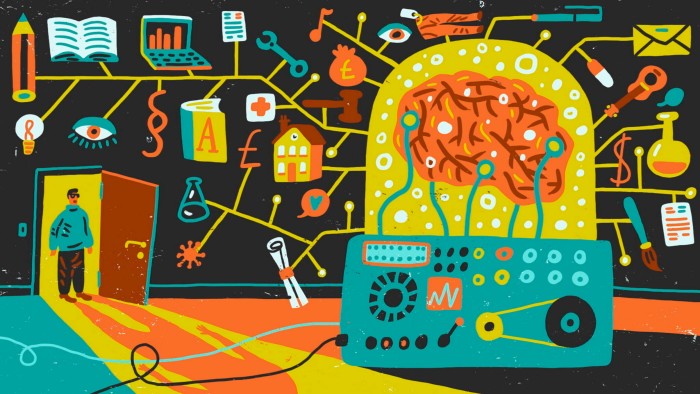Unlock the Editor’s Digest for free
Roula Khalaf, Editor of the FT, selects her favourite stories in this weekly newsletter.
Artificial intelligence, or AI, is extremely popular today, but the technology has existed for decades — the term goes all the way back to the 1950s.
There have been huge advances recently, though, and these days AI can do all sorts of things, from playing chess and Pokémon to making pictures, writing computer code and completing research.
As these systems become more widely used and available in schools, universities and jobs, it is essential to understand how AI works and how to use it well. Seven out of 10 US teens have used at least one type of generative AI tool, according to research from non-profit organisation Common Sense Media, with more than half using it most often for homework.
The main thing to remember is that best-performing AI systems are based on language: text, numbers, video or images. The more specific the instructions and information it has, the better it can answer your requests.
Navigating the Digital World
“As new technologies come online, much like with the calculator or the internet, it does take a little bit of time for society to adapt to using them and I expect AI is going to look like a similar transition as well,” says Daniela Amodei, co-founder and president of Anthropic, a company that creates AI models and products, including its chatbot Claude.
Earlier this year, Claude went viral for completing the video game Pokémon. But Claude and similar products like OpenAI’s ChatGPT or Google’s Gemini have also been incredibly successful at coding exercises, meaning they can create software.
They are also good at completing administrative tasks, especially writing or analysing text like emails or essays. Recent advances mean you can instruct your AI system to spend some time looking into a topic or question, rather than trying to answer straight away. AI can reference the internet and consider the usefulness of the information it gives you, and what form to provide it in.
“AI is the greatest gift to learning,” says Lisa Gevelber, founder of Grow with Google, which aims to improve AI literacy and skills. “You can move more quickly through the routine stuff and really get into the expert, important stuff by using AI. People who know how to use those tools and then apply their own expertise, judgment, and talents to what the AI tool provides are the best combination.”
However, many people advise against relying too much on AI systems for homework or jobs, as they can still make errors, and the user is seen as ultimately responsible. AI can create content that is not factually accurate, and it can be hard to tell why it reached a particular decision.
“AI is kind of like a parrot that learns by listening,” says Robbie Torney, from Common Sense Media. “AI has learned from the entire internet, so it picks up the same stereotypes and biases that exist [there], which means it might output things like men are scientists or teachers are women.”
There are also increasing concerns about over-reliance on these tools for education or friendship, which may prevent individuals from learning information or developing social skills.
So education experts and career advisers say it’s important to be able to critically assess the results that AI systems produce.
“Finish high school with really strong core competencies that position you well for college, but try also to distinguish yourself with unique skills in creativity and empathy,” advises Robin Lake, director at the Center on Reinventing Public Education, an education reform organisation. “Think about focusing on skills that (for now at least!) only the human mind and body possess.”

Research from the World Economic Forum suggests that 40 per cent of employers expect to reduce their workforce where AI can automate tasks. But the research also suggests that AI will create 11mn jobs while erasing 9mn existing roles, leading to questions about what careers will exist in the future for younger generations.
“AI can be a great starting point — it’s quick, fairly accessible and can help you organise your thoughts, generate examples, or understand a bit what employers might be looking for. But it’s important to remember that AI is limited to the data it’s trained on — it doesn’t know you, your goals, or what motivates you,” says Leanne Bisatt, employability and placements adviser at the University of Exeter.
“Think of AI as one of many tools in your toolkit. It can support your career thinking, but it doesn’t replace the importance of real-world experience, good information through independent research and working with career professionals, and your own decision-making.”
